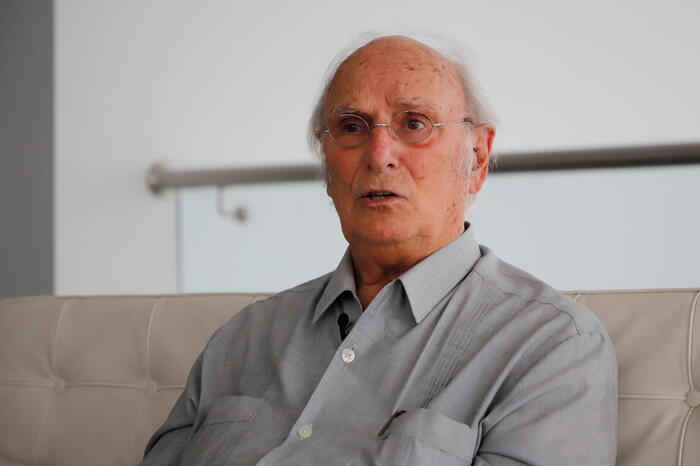Before Pedro Almodovar and after Luis Bunuel, CARLOS SAURA was certainly the best known Spanish director in the world.
Born in Huesca in Aragon on January 4, 1932, he passed away today, out of breath, at the age of 91, just on the eve of the most coveted award: the Goya Lifetime Achievement Award that all Iberian cinema awarded him with a homage, even belated, to his art.
Three very different generations of viewers discovered, got to know and loved him: the international audience that saw his talent during the Franco era when, barely 30 years old, his debut with the neorealist "Los Golfos" (The rascals) revealed him in 1960 at the Cannes Film Festival, then censored for two years at home.
The Spanish public of the 70s caught in his most personal works-tinged in surrealism at the
shadow of Bunuel ("Cria Cuervos" and "Mama cumple 100 anos") - a robust voice against dying Francoism.
World cinema finally celebrated his pictorial and interdisciplinary turning point when he embraced the suggestions of cinema-ballet with the great dance trilogy of the 80s ("Bodas de sangre", "Carmen", "El amor brujo") inspired by the partnership with Antonio Gades.
In the last twenty years his production took on a frenetic pace with one film a year, increasingly linked to the taste for staging, pictorial experimentation, the relationship with history and the arts.
He loved very much his 2001 "Bunuel and King Solomon's table" in which he staged his teacher in the company of his youth friends Salvador Dalì and Garcia Lorca in a dreamlike journey through youth, surrealism, memory and myth .
"It's my most beautiful and personal film - Saura once said - but it's only me who likes it. I'm firmly convinced that Bunuel would have loved it, also because it comes from my conversations with him. But we'd probably be the only two admirers" .
He was more successful with the previous "Goya" of 2000 and "Io, Don Giovanni" of 2009,
but he did not stop working until his last years, with the 2016 documentary on Renzo Piano. Born into a liberal and bourgeois family on the eve of the Civil War, he spent his early years in the company of his parents (a government official and a talented pianist) among Barcelona, Valencia and Madrid until, with the victory of the dictator Francisco Franco, he was sent back to Huesca by his grandparents, nationalists and conservatives.
Of the years of the civil war and the abrupt change of education, he always kept a vivid and dramatic memory, which certainly influenced his rebellious choices, stimulated by his older brother Antonio, an established abstract painter of the Surrealist school.
He entered the experimental film school at the age of twenty, he graduated after four years with his first documentary, "Sunday afternoon" and will alternate the
Three years earlier, at a retrospective in Montpellier, he had seen the cinema of the exiled Luis Bunuel and met his mentor.
This is certainly one of the keys to entering the creative universe of Carlos Saura who would have paid tribute to Bunuel in films that Francoism did not like in terms of themes (the desecration of the family, sick eroticism, the shadow of death) and style (the dreamlike, surrealism) such as "The Hunt" (Silver Bear in Berlin in 1966), "The Garden of Earthly Delights", "Anna and the Wolves", "Cousin Angelica".
If Bunuel was a master, Geraldine Chaplin was his muse ever since "Peppermint Frappé" in 1967 when she began an artistic and sentimental partnership that would mark the entire career of the man and the director.
Who, moreover, already had one marriage behind him, would later live two more with as many as seven children.
The disputed Golden Bear in Berlin in 1981 with "Deprisa Deprisa" marks an important watershed in Saura's oeuvre.
Caudillo Franco had been dead for six years and Spain was slowly opening up to democracy.
The politically engaged director gave way to the singer of memory and traditions, themes expressed through the passion for a choreographic idea of representation, the cult of popular music, the pleasure of cinema as a painting of emotions.
To this Saura would have dedicated the whole second part of his life, winning honors everywhere, but basically considered in his homeland by now as a "noble father", dedicated to calligraphy.
In truth the old lion still had many strings to his bow and he proved it with a relentless research into form and art transfigured by visual invention.
For this reason, today the Goya Lifetime Achievement Award puts the final seal on his life.
In accepting it he had written: "" I have been lucky in life doing what attracted me the most: I have directed cinema, theater, opera and I have drawn and painted all my life "

